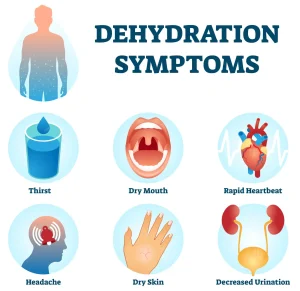Overview
Diagnosis
A healthcare professional can often diagnose dehydration based on symptoms. In children, a change in body weight might also be used for diagnosis.
To confirm dehydration and determine its severity, your healthcare provider may recommend the following tests:
-
Blood tests – These check electrolyte levels (especially sodium and potassium) and assess how well the kidneys are functioning.
-
Urinalysis – This test helps show how dehydrated you are and can also detect possible bladder infections.
Treatment
The primary treatment for dehydration is to replace lost fluids and electrolytes. The method depends on age, severity, and the underlying cause.
-
Infants and children – For dehydration caused by diarrhea, vomiting, or fever, give fluids containing electrolytes, such as Pedialyte or Smart Water. Start with small amounts — about one teaspoon (5 ml) every few minutes — and increase gradually. Older children can drink diluted sports drinks (1 part sports drink to 1 part water).
-
Adults – Mild to moderate dehydration can usually be treated by drinking water or other fluids. Avoid full-strength fruit juices or soft drinks, as they can worsen diarrhea.
-
During heat or exercise – If working or exercising outdoors in hot or humid weather, drink cool water or sports drinks containing electrolytes and carbohydrates.
-
Severe dehydration – Requires immediate medical treatment. Fluids and salts are given intravenously (IV) in hospitals or by emergency workers to quickly restore hydration.
Preparing for Your Appointment
If dehydration symptoms are severe — such as extreme fatigue, confusion, or unresponsiveness — seek immediate emergency care. For less severe cases, preparing for your appointment can help your healthcare provider make a quick and accurate diagnosis.
What you can do:
-
List symptoms and note when they began. Include details about vomiting or diarrhea duration.
-
Write down key personal details such as recent travel or unusual food intake.
-
Note any medical conditions and list all medications, vitamins, or supplements.
-
Prepare questions to ask your doctor.
Questions you may ask:
-
What is causing my symptoms?
-
What tests do I need?
-
What treatment do you recommend?
-
How long will recovery take?
-
How can I prevent dehydration in the future?
Your doctor may ask:
-
What were you doing when symptoms began?
-
Are you able to keep food or fluids down?
-
When did you last urinate, and was it painful?
-
Do you have other symptoms such as fever, cramps, or headaches?
-
Have you noticed blood in your stool?
Advertisement

